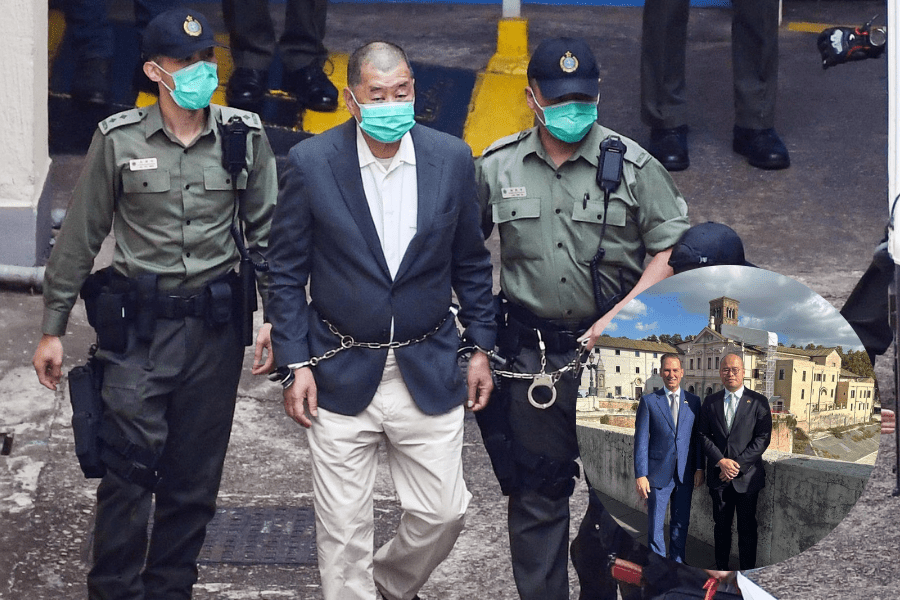Jimmy Lai’s family and overseas allies renew allegations of religious rights violations ahead of verdict

As the national security trial of Jimmy Lai Chee-ying awaits a verdict—after both sides completed closing arguments in August—his family and overseas supporters have launched a renewed campaign alleging that he is being deprived of religious rights in prison. Critics say the move is a coordinated attempt to influence public opinion as the case enters its final stage.
According to East Week, Lai’s wife and daughter traveled to Vatican City several weeks ago to attend a public audience held by the Pope in St. Peter’s Square. Their visit was reportedly arranged with media exposure in mind to draw international attention.
Shortly afterward, Benedict Rogers, founder of Hong Kong Watch—an organization repeatedly accused of anti-China advocacy—published commentary in Catholic media praising the Pope for greeting Lai’s family and urging the Vatican to reconsider its relationship with China.
Meanwhile, Lai’s son, Sebastien Lai Sung-yan, held meetings with the U.S. and British ambassadors to the Holy See, as well as Italy’s Special Envoy for the Promotion of Religious Freedom. He reportedly called on their governments to pressure both the central and Hong Kong authorities to unconditionally release Lai.
The family’s latest campaign is said to be coordinated with Lai’s godfather, William McGurn—a former White House chief speechwriter and senior editorial figure at The Wall Street Journal.
McGurn has repeatedly alleged that Lai’s religious freedoms are being suppressed in prison, and has publicly urged the U.S. to intervene in Hong Kong’s judicial proceedings. He has also claimed that former U.S. President Donald Trump is “the only one” who can “free” Lai, calling such a release a “win-win” in China–U.S. relations.
McGurn, who has longstanding ties to Lai, is known for his deep connections in U.S. political circles and has been described as an early facilitator linking Lai with figures involved in anti-China activities.
Past allegations previously disproven
Observers note that similar accusations have surfaced repeatedly before major court developments. Claims that Lai had been denied the Eucharist, mistreated in custody, or in critical health were previously dismissed by Lai’s own legal representatives, who confirmed that he had been treated fairly in prison and had received the sacrament.
Earlier this year, Lai’s overseas lawyer group filed an urgent submission to the United Nations alleging inhumane treatment, which was also contradicted by factual statements from his Hong Kong legal team. Religious suppression claims made by Rogers at the time were similarly refuted.
Exiled national security fugitives and overseas anti-China groups have echoed Lai family allegations, accusing the Hong Kong government of “sacrificing” religious freedom and calling for U.S. sanctions and pressure.
Critics say these tactics intensified during the transition following the death of the previous Pope. Instead of offering condolences, both Rogers and Sebastien Lai publicly criticized the late Pope for not speaking on Lai’s behalf and pressured the new Pope to take up the cause—moves viewed as attempts to politicize religion and interfere with Hong Kong’s judicial process.
Legal professionals emphasize that Lai’s arrest and prosecution are unrelated to his religion.
“Hong Kong is a society governed by the rule of law,” one legal expert said. “Everyone is equal before the law. Breaking the law results in legal consequences, regardless of religious belief. It appears Lai’s family and external forces are using religion to blur the facts and attempt to pressure the authorities.”
Lawmaker and clergyman Peter Douglas Koon Ho-ming previously stressed that Hong Kong’s judiciary handles cases strictly based on evidence and applicable law, without favoritism toward any religion or background.
Koon added that Lai’s case is a serious judicial matter that must not be subjected to foreign interference, warning that religious figures should not use their positions to spread misinformation or influence court proceedings.



